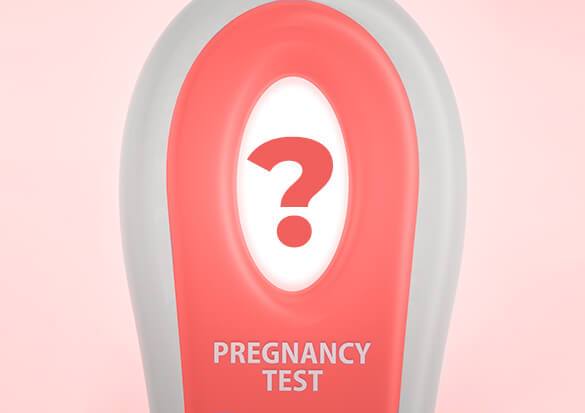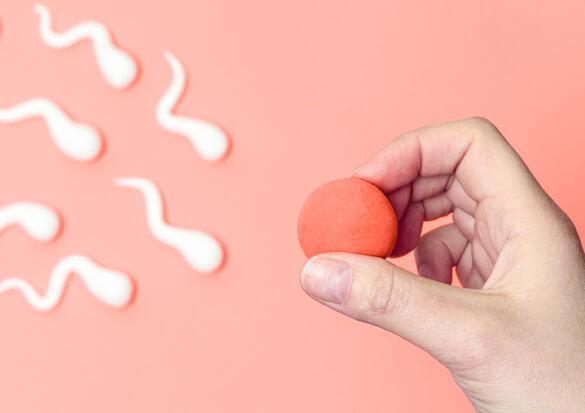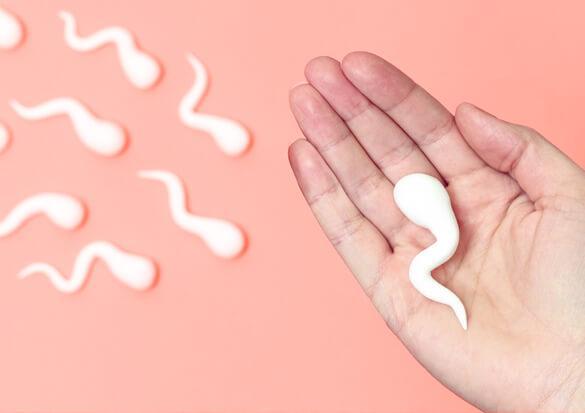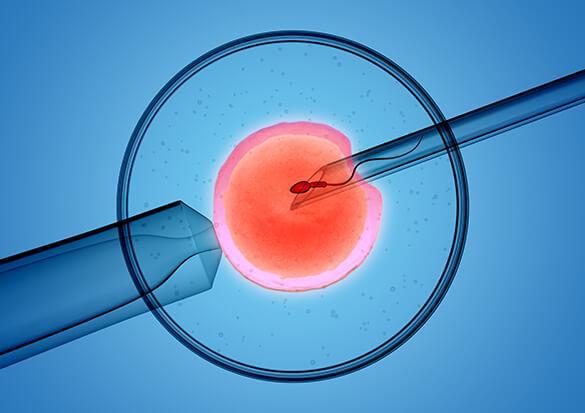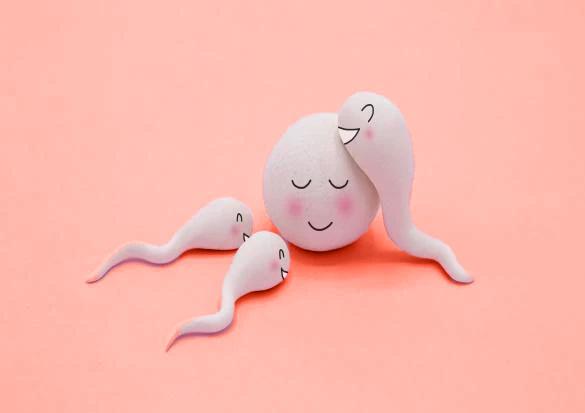How can I increase my chances of conception?
Lifestyle changes may help to optimise your general health and improve your chances of getting pregnant. See what changes you can make to increase your chances of conception.
No matter how long you have been trying to conceive, there are some lifestyle changes that you and your partner can make to help improve your chances.
In this blog, we look at the different lifestyle factors that can affect your ability to conceive, including:
Plus, we answer the question: is there anything I should avoid when trying to conceive?
1. Nutrition
The lifestyle choices that you and your partner make have an impact on your fertility.
Having a healthy balanced diet is crucial, and good nutrition is the building block for sperm and egg health [1]. The best foods for getting pregnant are the same foods that we are recommended for general wellbeing.
Recommended foods to eat when trying to conceive [2]:
- Eat more fruit and vegetables, especially leafy green vegetables.
- Avoid saturated fats such as fried foods, pastries and cakes.
- Eat more unsaturated fats such as avocados, nuts and oily fish.
- Choose wholegrain high-fibre foods such as bread with seeds, brown rice and brown pasta.
2. Weight and exercise
Having a healthy body max index (BMI) is important for good fertility. If either you or your partner is overweight, your chances of getting pregnant can be reduced [3].
You can use the below BMI calculator to work out your's and your partner’s BMI.
Supplied by BMI Calculator UK
If either you or your partner has a high BMI, bringing it down, even by a little, can help you have a healthy pregnancy and baby.
Other than diet, the best way to get closer to a healthy BMI is to become more active. It is recommended that you do a mixture of cardiovascular exercises such as running, and weight training.
You don’t have to exercise for long, and short ten-minute bursts can be beneficial and may be easier to fit into your day.
Exercise is not just for weight loss either. It has other benefits such as boosting your mood [4], energy levels and general health. Making small changes like standing up as much as possible can help you lose weight, as staying on your feet uses more calories than sitting and is better for your long-term health.
3. Supplements
You may choose to consider how supplements may help improve your fertility, such as folic acid and vitamin D. We look at some of the potential benefits of taking supplements when trying to conceive.
Folic acid: Women trying to conceive are advised to supplement with a daily dose of 400 micrograms of folic acid. Folic acid can help prevent birth defects known as neural tube defects, including spina bifida [5].
Vitamin D: The Department of Health and Social Care also recommends that men and women take a vitamin D supplement between September and March as this can help improve your vitamin D reserve through the winter months [6]. You can check your vitamin D levels with our Vitamin D Blood Test.
Vitamin A: It is advised that you do not take vitamin A supplements, or any supplement that contains vitamin A such as retinol, as too much of this could harm your baby. Always check the label of any supplements you choose to take and ask your doctor if you are unsure.
Vitamin C: Some couples may require other supplements based on their current health and diet. For example, if a male has a poor sperm count, he may need to take vitamin C supplements.
It is best to discuss supplements with your doctor, nutritionist, or fertility expert to find the right supplements for you.
4. Getting to know your menstrual cycle
Your menstrual cycle is when an egg develops and releases from the ovary. At the same time, the lining of the uterus thickens to prepare for pregnancy. If the egg isn’t fertilised or doesn’t implant, the lining of the uterus sheds, and you have your period.
Sometimes it can be hard to understand your menstrual cycle and have confidence in when you are most fertile. For women who don’t have regular cycles, or may not be ovulating, it can be even harder. Taking the time to learn about your cycles and what your body is telling you can reduce the time it can take for you to conceive.
If you know the dates and length of your menstrual cycle, you can use an ovulation calculator to find out your most fertile window. If you are struggling to remember the dates, there are plenty of apps that can help you to track your period.
Whether your cycle is long or short, you will usually ovulate 10-16 days before the start of your next period, however, this can vary between women, which is why identifying when you have ovulated is vital for the time of intercourse.
Ovulation triggers the production of progesterone, which prepares the lining of the uterus for implantation. Your womb lining needs to be spongy, thick, and full of nutrients so that a fertilised egg can implant.
There are other ways of identifying your window of fertility. These include:
- Cervical mucus - Your cervical mucus can give you clues about when you are fertile. At the beginning and end of your cycle, your cervical mucus is creamy, sticky, and thick. Around ovulation, it becomes wetter, more transparent, slippery, and stretchy like raw egg white.
- Basal body temperature – Your basal body temperature is your temperature immediately on waking. It can help you know if you have ovulated, as it dips slightly before ovulation, and rises afterwards. Using your temperature, along with observing the changes in your cervical mucus, can help you to identify when you are fertile, helping you to conceive.
- Ovulation Kits – You may choose to use an ovulation kit or fertility app to help you track your cycles. Ovulation kits involve testing your urine on specific days in your cycle to detect luteinising hormone (LH) which surges 24-36 hours before ovulation.
Though all the actions above can help you to optimise your ability to conceive, it is necessary to remember that having regular sex, every two to three days, is the most critical factor in helping you to get pregnant.
Is there anything I should avoid when trying to conceive?
You may have heard of things that you need to avoid when pregnant, such as soft cheeses, fish that contains too much mercury, or cured meats.
We look at what you should try to limit or avoid when trying to conceive, including:
1. Alcohol and drugs
The Department of Health and Social Care recommends that women should not drink any alcohol if they are planning to become pregnant [7]. Men should also limit their intake to no more than 14 units of alcohol per week.
Excessive drinking (including binge drinking) can be damaging to healthy sperm production [8]. Recreational drugs may also impact your fertility, and it is advisable to avoid taking any drugs when trying to conceive.
2. Caffeine
Drinking a lot of caffeine before conception and during pregnancy can be associated with an increased risk of miscarriage, stillbirth and low birth weight [9].
Advice from the NHS, World Health Organisation (WHO), and The Royal College of Obstetricians and Gynaecologists (RCOG) is that pregnant women can safely consume up to 200mg of caffeine daily. However, recent research suggests that risk increases steadily with caffeine intake, so while up to 200mg of caffeine daily is the official guidance, Tommy’s recommends getting it as low as possible.
Instead of your daily coffee, try switching to herbal teas as alternatives, and increase your water consumption to two to three litres a day, as water helps flush out any impurities.
3. Smoking
Smoking can have a considerable effect on both sperm and egg quality, and it is recommended that you don’t smoke whilst trying to conceive [10].
If you do smoke, it can be difficult to stop. However, your doctor can offer guidance and the NHS offers lots of support, including a quit smoking app.
4. Toxins
Toxins are substances that occur naturally and are harmful to living things [11].
Toxins found in the environment have the potential to damage sperm, eggs, and the development of a foetus [12].
Although it is impossible to avoid all environmental toxins, it is possible to reduce your toxin exposure to benefit your fertility.
Ways to reduce your exposure to toxins include:
1. Avoiding plastics
BPA is a toxin that is found in plastics that you may use daily, including water bottles, cling film, coated saucepans, plastic containers, bank cards and even receipts.
BPA has been named an endocrine disruptor, meaning that it can disrupt your hormones. Due to the disruption in hormones, it has been linked to infertility and breast cancer [13].
Instead of using plastic water bottles, it is recommended to use a BPA-free reusable bottle or drink out of a glass. It is also recommended to store food in BPA-free plastic or glass containers, rather than using cling film.
2. Reconsidering your beauty products
Many beauty products such as body washes, shampoos, conditioners, perfume, and nail varnish, contain parabens and other toxins that can affect male and female fertility.
On average, a woman uses 12 beauty products per day, containing a staggering 168 different chemicals [14].
It may not be feasible to change all your beauty products at once, but over time, try to buy more natural products.
3. Reconsidering cleaning products and air fresheners
Cleaning products can be full of harsh toxins. However, more recently, it has become easier to purchase more natural alternatives.
When using any cleaning products, wear gloves to avoid the chemicals touching your skin, and make sure you are using them in a well-ventilated area.
Air fresheners contain phthalates which are also endocrine disrupters and can quickly get into your system through your nose [15]. They go directly to the hypothalamus in your brain, which can impact your hormone imbalance.
It is recommended to avoid the use of spray air fresheners as well as plug-in diffusers and keep your windows open to let your house, or workplace, breathe naturally.
References
- Panth, N. et al. (2018) The influence of diet on fertility and the implications for Public Health Nutrition in the United States, Frontiers in public health. U.S. National Library of Medicine. Available at: https://www.ncbi.nlm.nih.gov/pmc/articles/PMC6079277/ (Accessed: November 22, 2022).
- Tips for a healthy pre-pregnancy diet (no date) Tommy's. Together, for every baby. Available at: https://www.tommys.org/pregnancy-information/planning-a-pregnancy/are-you-ready-to-conceive/tips-healthy-pre-pregnancy-diet (Accessed: November 22, 2022).
- Overweight and fertility when planning a pregnancy (no date) Tommy's. Together, for every baby. Available at: https://www.tommys.org/pregnancy-information/planning-a-pregnancy/are-you-ready-to-conceive/overweight-and-fertility-when-planning-pregnancy (Accessed: November 22, 2022).
- More evidence that exercise can boost mood (2019) Harvard Health. Available at: https://www.health.harvard.edu/mind-and-mood/more-evidence-that-exercise-can-boost-mood (Accessed: November 22, 2022).
- Vitamins, supplements and nutrition in pregnancy (no date) NHS choices. NHS. Available at: https://www.nhs.uk/pregnancy/keeping-well/vitamins-supplements-and-nutrition/#:~:text=Folic%20acid%20before%20and%20during%20pregnancy&text=Folic%20acid%20can%20help%20prevent,find%20out%20you're%20pregnant (Accessed: November 22, 2022).
- Vitamin D (no date) NHS choices. NHS. Available at: https://www.nhs.uk/conditions/vitamins-and-minerals/vitamin-d/ (Accessed: November 22, 2022).
- Drinking alcohol while pregnant (no date) NHS choices. NHS. Available at: https://www.nhs.uk/pregnancy/keeping-well/drinking-alcohol-while-pregnant/ (Accessed: November 22, 2022).
- Jensen, T.K. et al. (2014) Habitual alcohol consumption associated with reduced semen quality and changes in reproductive hormones; a cross-sectional study among 1221 young Danish men, BMJ Open. British Medical Journal Publishing Group. Available at: https://bmjopen.bmj.com/content/4/9/e005462 (Accessed: November 22, 2022).
- James, J.E. (2021) Maternal caffeine consumption and pregnancy outcomes: A narrative review with implications for advice to mothers and mothers-to-be, BMJ Evidence-Based Medicine. Royal Society of Medicine. Available at: https://ebm.bmj.com/content/26/3/114 (Accessed: November 22, 2022).
- Kovac, J.R., Khanna, A. and Lipshultz, L.I. (2015) The effects of cigarette smoking on male fertility, Postgraduate medicine. U.S. National Library of Medicine. Available at: https://www.ncbi.nlm.nih.gov/pmc/articles/PMC4639396/ (Accessed: November 22, 2022).
- Toxin (no date) Toxin - an overview | ScienceDirect Topics. Available at: https://www.sciencedirect.com/topics/earth-and-planetary-sciences/toxin (Accessed: November 22, 2022).
- By: Lisa J. Zhang Jeffrey Roberts et al. (no date) Lisa J. Zhang, Jeffrey Roberts, MD, FRCSC, Caitlin Dunne, MD, FRCSC. optimizing fertility part 2: Environmental toxins. BCMJ, vol. 62, no. 9, November, 2020, page(s) 323-327 - clinical articles., -. Available at: https://bcmj.org/articles/optimizing-fertility-part-2-environmental-toxins#:~:text=ABSTRACT%3A%20Environmental%20toxins%20have%20the,their%20negative%20effects%20on%20fertility (Accessed: November 22, 2022).
- (no date) Exposure to chemicals in plastic. Available at: https://www.breastcancer.org/risk/factors/plastic (Accessed: November 22, 2022).
- Toxic beauty (2020) Harvard Health. Available at: https://www.health.harvard.edu/womens-health/toxic-beauty (Accessed: November 22, 2022).
- Jpatel (no date) Environmental health, Department of Health | Environmental Health. Available at: https://www.nj.gov/health/ceohs/ (Accessed: November 22, 2022).
Related tests
Day 3 Fertility Blood Test
Measure your reproductive hormones to get an idea of your ovarian reserve and egg production
- Results estimated in 2 working days
- 3 biomarkers
Finger-prick or Venous collection
Select testAnti-Müllerian Hormone (AMH) Blood Test
Check your level of anti-Müllerian hormone (AMH) to get an idea of your egg count (ovarian reserve) with our at-home finger-prick blood test
- Results estimated in 2 working days
- 1 biomarkers
Finger-prick or Venous collection
Select testTestosterone Blood Test
An easy and convenient Testosterone Blood Test kit to measure the total level of testosterone in your blood, a sex hormone essential for sex drive, muscle mass, fertility, and mood
- Results estimated in 2 working days
- 1 biomarkers
Finger-prick or Venous collection
Select test

